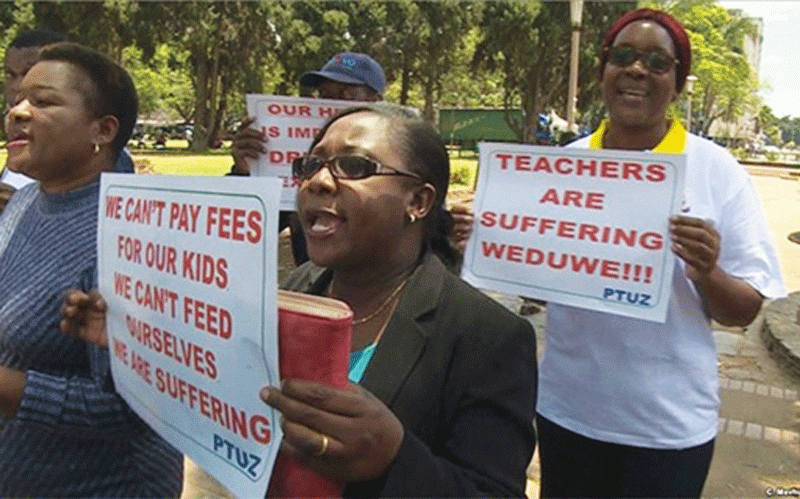
TEACHERS’ unions have warned that their members will not be able to report for work when schools open next week as they are incapacitated due to the rising cost of living.
The third term runs from September 10 to December 5.
Educators Union of Zimbabwe secretary-general Tapedza Zhou told NewsDay this week that the impoverishment of educators was largely affecting the quality of education for learners, urging the Public Service, Labour and Social Welfare ministry to resolve the salary issue with teachers.
The third term is crucial for examination pupils as it is devoted to revisions.
Grade 7 examinations begin this month and end on October 7. Ordinary and Advanced level examinations begin next month.
There is no time for pupils to prepare for the examinations.
The situation will be worsened if the threats by teachers are actualised.
Government and its employees have been at loggerheads over salaries for a long time.
- Solve teachers’ salary debacle once and for all
Keep Reading
The employees want a minimum salary above US$500.
Government says it is constrained as it is also scrounging for resources to mitigate the effects of the El Niño-induced drought, which has resulted in more than half of the population facing starvation.
The tough economic environment has left employees on the edge as salaries are outstripped by the rising cost of living, despite authorities painting a rosy picture after the introduction of the new currency, Zimbabwe Gold (ZWG), in April.
ZWG, introduced amid pomp and fanfare on the basis that it is backed by gold and forex reserves, has flattered to deceive and is depreciating against the United States dollar on the resurgent parallel market.
The premium on the parallel market is now over 50%, meaning we are back to the situation prevailing in the Zimdollar era.
Central bank chief John Mushayavanhu’s declaration that he will crush the parallel market has remained an empty threat, as the alternative market has been revived with vigour following the arrests of suspected foreign currency dealers at the launch of the new currency.
The depreciation of the local currency has fed into prices which have more than doubled since April, wiping away the salaries of most employees.
There is no doubt that the last quarter of the year will be punctuated by calls for salary reviews in the public and private sectors.
For parents with children writing examinations this year, it means they must dig deeper into their pockets to pay for extra lessons.
However, parents are also in a fix due to the tough economic environment.
A survey by the Amalgamated Rural Teachers Union of Zimbabwe revealed that parents and guardians in rural and urban areas will struggle to either pay school fees or secure learning materials.
In rural areas, the parents cited the effects of the El Niño-induced drought as the major driver of the unavailability of resources, the survey revealed.
It said learners from child-headed families also indicated that they would not be able to go back to school because of lack of basics, including food.
According to the survey, about eight out of 10 parents in high-density areas said they would struggle to pay school fees.
Some raised job losses as a driver of the poverty crisis, while those in the informal economy complained of low business returns in a depressed economy.
The ball is in the government’s court to engage its employees so that there won’t be disruptions for learners in this crucial part of the school calendar.
Engaging the concerned employees is the only way out.











